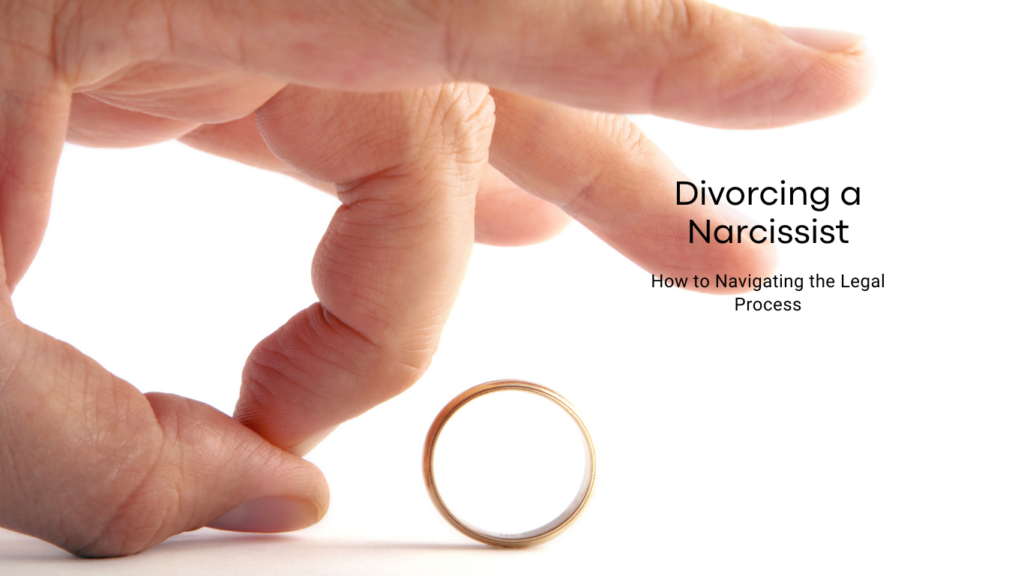Divorcing a narcissist is often an emotional and legal battlefield, requiring strategic planning and resilience. Understanding the stages—from recognizing the toxicity to rebuilding your life—can help you regain control and protect your well-being.
Are you struggling to divorce a narcissistic spouse? You are not alone. Many have faced this challenging situation, and it’s crucial to remember that you can reclaim your life and peace of mind. It’s a tough journey, but with support and determination, you can overcome this. You must understand that your journey is going to be harder than someone not divorcing a narcissist, and chances are your case will go on longer and cost more than someone divorcing someone that is not a narcissist. We’re here to guide you through each step with understanding and support.

Divorcing a Narcissist
Understanding your spouse’s narcissistic behavior is the first step towards gaining freedom and reclaiming your life. A narcissist tends to believe they are entitled to everything, lacks empathy, and seeks constant admiration. For example, when involved in competition they either win or they were cheated because it is very difficult for a narcissist to accept that someone else got the better of them. Recognizing these patterns can help you prepare mentally and emotionally for the road ahead.
A narcissist can initially be charismatic and charming, drawing people in with their allure. However, when their needs are not being met, they can become controlling, manipulative, and emotionally abusive. Recognizing these traits, such as excessive need for attention, lack of empathy, and a grandiose sense of self-importance, is crucial in identifying and understanding your spouse’s narcissistic behavior.
Divorcing a narcissist often means they will deploy manipulative divorce strategies to skew the situation in their favor. This makes the divorce process a battleground rather than a path to resolution. Expect them to use tactics like gaslighting, stonewalling, and smear campaigns to undermine your credibility and gain the upper hand. If you have children, they will attempt to turn the children against you or attempt to manipulate you into making concessions that you should not make because “it is for the kids.”
Preparing for a divorce from a narcissistic spouse requires meticulous and strategic planning. Your preparation should include gathering evidence, securing support, and planning for financial stability. This preparation will help you build a strong foundation to weather the storm ahead. Remember, knowledge is power, and having a clear understanding of your rights and options will help you navigate the divorce process.
Document everything of interest to your case meticulously. This includes: emails, text messages, financial records, and any instances of abusive behavior.
This documentation will serve as powerful evidence against the narcissist’s attempts to manipulate the proceedings and will be invaluable in court. Often times a narcissist cannot resist communication in texts or emails to manipulate you. Let them write away, but do not engage with their attempts to drag you into the mud.
Your emotional health is paramount during this process. Seek support from trusted friends, family, and therapists who understand the tumultuous journey of divorcing a narcissist. A knowledgeable attorney with experience in dealing with narcissistic personalities can also guide you through the legal complexities, ensuring your rights are protected.
Ensure your financial security by taking proactive steps. Start saving, create a budget, and plan for life post-divorce. Understanding your financial situation and having a clear plan will help you transition more smoothly into your new life.

Divorcing a Narcissist:
Divorcing a narcissist means bracing yourself for a difficult, long, and often contentious fight in court. Being well-prepared and having a strong legal team can make a significant difference. Although you have the right to represent yourself, it is not recommended when dealing with a narcissist. Understanding their tactics and maintaining a clear strategy can help you protect your interests. Stay informed and proactive throughout the process to ensure the best possible outcome.
Your attorney can help you file for divorce and protect your rights during this process. They will ensure that all legal documents are correctly prepared and submitted, providing you with a solid start to the proceedings. Additionally, they can offer valuable advice on how to manage interactions with a narcissistic partner throughout the divorce.
Expect manipulative tactics from the narcissist during court appearances and mediation sessions. Stick to the facts, stay calm, and let your lawyer handle the legalities. Avoid getting drawn into emotional confrontations, as this is often what the narcissist wants in order to destabilize you.
Don’t engage with the narcissist’s manipulative tactics. Stay focused entirely on the facts and present your case clearly and confidently. Let your lawyer do the talking and negotiation for you. Your composure and clarity will help you maintain the upper hand.
Life after divorcing a narcissist needs ongoing vigilance, especially with co-parenting. It’s important to set new boundaries to protect yourself and your kids. Therapy and support groups can help you navigate this tough time. Prioritize your mental health for a stable future. You’ve got this.
Handling a narcissistic ex can be stressful and challenging. Keep boundaries firm and communication minimal to protect your children from any negative influence. Use structured communication methods, such as email or custody management tools, to document interactions and reduce conflict. Your communication should be kept to only the necessary communication to avoid being drawn into their manipulation games.
After the storm comes the calm. Seek therapy if you have not already started, cultivate new hobbies, and build a new life full of positivity and self-discovery. Think about all the things you have wanted to do, and make a plan to do it! Surround yourself with supportive people and take time to heal from the emotional wounds inflicted by the narcissist.
Ensure that you have sufficient legal protection against further manipulation or harassment from your narcissistic ex-spouse. This may include restraining orders, custody agreements, or other legal measures designed to safeguard your well-being and that of your children.
We at Reidy Law Office are here to support you through your entire journey of divorcing a narcissist. We understand the unique challenges you face and offer tailored strategies to help you navigate each stage of divorce with a narcissist. Reach out to us today to learn more about how we can help and to begin crafting a brighter future for yourself and your loved ones.
Contemplating divorce is a profound step that involves emotional, financial, and legal considerations. Our "Am I Ready for Divorce?" checklist is a sensitively designed tool that helps individuals thoughtfully assess their readiness for this life-altering decision. This resource aims to guide you through introspection and practical evaluation, ensuring that your decision to pursue a divorce is made with both clarity and foresight.
In any legal or financial undertaking, having a comprehensive and organized set of financial records is critical. Our "Financial Records Checklist" is crafted to give you the clarity and control needed to manage your finances effectively. Whether you're preparing for tax season, undergoing legal proceedings, or simply aiming to get your financial house in order, this checklist is an indispensable tool for ensuring nothing is overlooked.
Divorce not only signifies a major shift in the lives of the parents but also heralds a period of adjustment and emotional transition for the children involved. Our meticulously crafted checklist, "Do Your Kids Need Therapy After Divorce?" is a vital resource for parents concerned about the psychological welfare of their children during and after a divorce. This checklist serves as a compassionate guide for recognizing signs of distress and taking proactive steps to support your child's mental health.
Divorce can be a complex and emotionally taxing journey, but when both parties agree on the key terms, an uncontested divorce can offer a more amicable and efficient path forward. Our Uncontested Divorce Checklist is a comprehensive guide designed to provide individuals with a clear roadmap through the legal process when there are no children involved. This free resource ensures that you are well-prepared, informed, and ready to proceed with confidence.